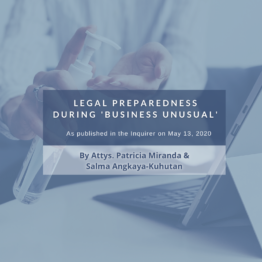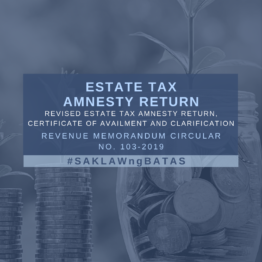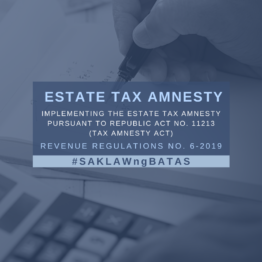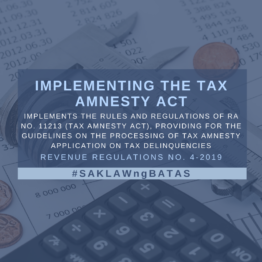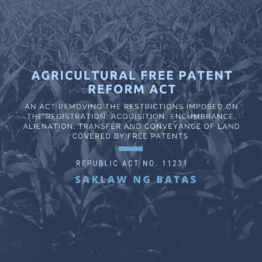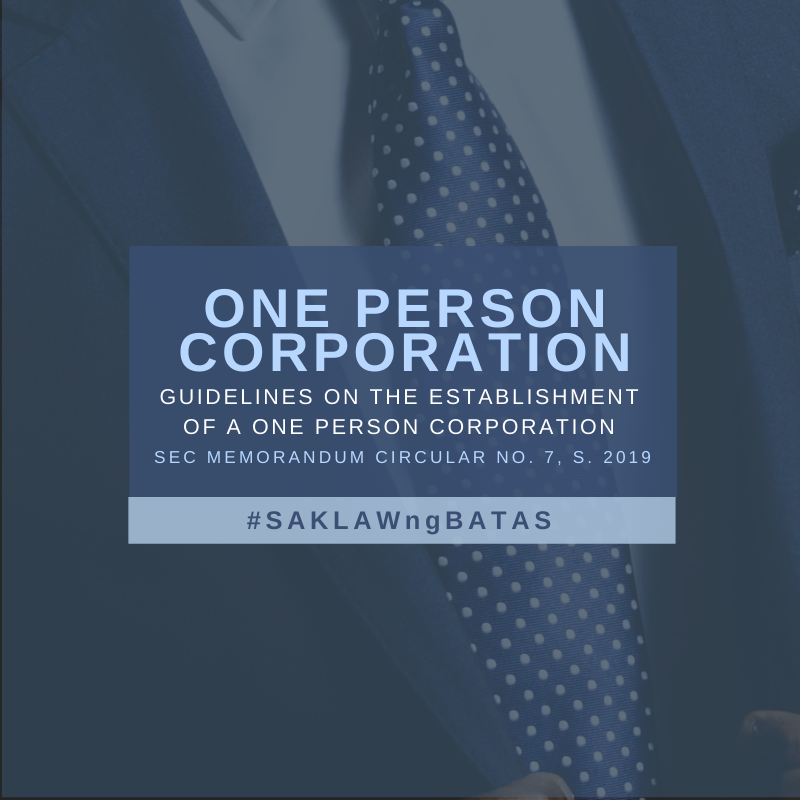
One of the innovations introduced by Republic Act No. 11232, otherwise known as the “Revised Corporation Code of the Philippines” (RCC) is the One Person Corporation (OPC). OPCs offer many advantages for small and medium enterprises (SMEs) in terms of limitations on liability and taxation benefits, among others. The benefit of limiting the business owner’s liability is not available in the case of a sole proprietorship.
The OPC is expected to become a more profitable business vehicle in the years to come, with the recent passage of Republic Act No. 11534, otherwise known as the “Corporate Recovery and Tax Incentives for Enterprises” (CREATE) Act, which reduced Regular Corporate Income Tax (RCIT) rates from 30% to 20% for domestic corporations with net taxable income not exceeding PhP5 Million and with total assets not exceeding PhP100 Million, and from 30% to 25% for all other domestic corporations and resident foreign corporations, effective July 1, 2020.
Under the CREATE Act, the Minimum Corporate Income Tax (MCIT) rate is also reduced from 2% to 1% of gross income (revenue less cost of sales) effective July 1, 2020 to June 30, 2023. Note that the MCIT is imposed if a corporation has negative taxable income, or the MCIT is higher than 30% Regular Corporate Income Tax (RCIT).
Essentially, this means that SMEs, particularly those currently managed as a sole proprietorship, may enjoy lower taxes if they opt to organize as an OPC (or a regular corporation). This depends on the income and expense levels of the business, so it is always best to consult a tax attorney or consultant.
What is a One Person Corporation (OPC) and Who May Form an OPC?
Republic Act No. 11232, otherwise known as the “Revised Corporation Code of the Philippines” (RCC) allows the formation of an OPC.
An OPC is a corporation with a single stockholder, who can only be a natural person, trust or restate.
The incorporator of an OPC, being a natural person, must be of legal age.
As an incorporator, the “trust” as used by the law does not refer to a trust entity, but the subject being managed by a trustee.
If the single stockholder is a trustee, administrator, executor, guardian, conservator, custodian, or other person exercising fiduciary duties, proof of authority to act on behalf of the trust or estate must be submitted at the time of incorporation.
Term of Existence
In case the single stockholder of the OPC is a natural person, the term of existence of the OPC shall be perpetual. In case of death or incapacity of the natural person, the nominee and alternate nominee, which is required to be designated by the single stockholder in the Articles of Incorporation, shall replace him or her.
In case of a trust or estate, its term of existence shall be co-terminous with the existence of the trust or estate. The OPC under the name of the estate may be dissolved upon proof of partition, such as a court-issued order of partition or an extrajudicial settlement. Similarly, the OPC under the name of the trustee may be dissolved upon proof of termination of the trust.
Who may be the Directors and Officers of the OPC?
The single stockholder shall be sole Director and President of the OPC.
Within 15 days from the issuance of its Certificate of Incorporation, the OPC shall appoint a Treasurer, Corporate Secretary, and other officers, and notify the SEC thereof within 5 days from appointment, using the Appointment Form as may be prescribed by the SEC.
The single stockholder shall not be appointed as the Corporate Secretary but may assume the role of a Treasurer.
If the single stockholder assumes the position of the Treasurer, a surety bond is required to be posted and maintained by renewing it every two years or as may be required upon review of the annual submission of the audited financial statements/financial statements. The bond may be cancelled upon proof of appointment of another person as the Treasurer.
The amount of the surety bond coverage depends on the amount of the authorized capital stock:
| Authorized Capital Stock | Surety Bond Coverage |
| 1.00 to 1,000,000.00 | 1,000,000.000.00 |
| 1,000,001.00 to 2,000,000.00 | 2,000,000.000.00 |
| 2,000,001.00 to 3,000,000.00 | 3,000,000.000.00 |
| 3,000,001.00 to 4,000,000.00 | 4,000,000.000.00 |
| 4,000,001.00 to 5,000,000.00 | 5,000,000.000.00 |
| 5,000,001.00 and above | Equal to the OPC’s Authorized Capital Stock |
What Types of Documentation are Needed to form an OPC?
1. Articles of Incorporation (AOI)
An Articles of Incorporation (AOI) is needed to form an OPC. The AOI must include the following information:
- primary purpose;
- principal office address;
- term of existence;
- names and details of the single stockholder;
- the nominee and alternate nominee;
- the subscribed and paid-up capital; and
- such other matters consistent with law and which may be deemed necessary and convenient.
Note: There is no need for the usual by-laws of regular corporations.
2. Written Consent from the Nominee and Alternate Nominee
The OPC is required to have a nominee and alternate nominee who will take over in the event of death or incapacity of the single stockholder. The written consents of such nominee and alternate nominee are required to be attached to the AOI upon filing with the SEC.
3. Other Requirements (As Applicable)
| Specific Circumstance | Documentary Requirement |
| For trusts and estates incorporating as OPC | Proof of Authority to Act on Behalf of the Trust or Estate |
| For foreign natural person | Foreign Investments Act (FIA) Application Form |
| For Filipino single stockholder | Tax Identification Number (TIN) |
| For Foreign single stockholder | Tax Identification Number (TIN) or Passport Number |
| In case not provided in the AOI | Affidavit of Undertaking to Change Company Name |
May One Practice His/Her Profession through an OPC?
No. A natural person who is licensed to exercise a profession may not organize as an OPC for the purpose of exercising such profession, except as otherwise provided under special laws.
May a Foreign National Establish an OPC to Do Business in the Philippines?
Yes, a foreign natural person may put up an OPC, subject to the applicable requirement and constitutional and statutory restrictions on foreign participation in certain investment areas or activities.
What are the Reportorial Requirements of an OPC?
The OPC is required to submit the following documents within the period required by the SEC:
- Annual audited financial statements* within 120 days from the end of its fiscal year as indicated in its AOI;
- A report on all explanations or comments by the President on the qualification, reservation, or adverse remarks made by the auditor in the financial statements;
- a disclosure of all self-dealings and related party transactions entered into between the OPC and the single stockholder; and
- other reports as the SEC may require.
*Note: If the total assets of total liabilities of the OPC are less than PhP600,000.00, the financial statements must be certified under oath by the OPC’s Treasurer.
What are the Expected Costs to Form an OPC?
The major cost components to form an OPC include the following:
1. Filing Fees
| Item Description | Cost |
| Name Reservation | PhP100.00 per company name and/or trade name |
| Articles of Incorporation | 1/5 of 1% of the authorized capital stock but not less than PhP2,000.00 |
| Legal Research Fee (LRF) | 1% of the Registration/Filing Fee but not less than PhP20.00 |
| FIA Application Fee (if the single stockholder is a foreign national) | PhP3,000.00 |
| Documentary Stamp | PhP30.00 |
2. Legal/Paralegal Fees
The legal/paralegal fees will typically include a fixed fee, which may be payable based on different milestones of the engagement. The fee will typically cover the preparation and collation of the documentary requirements for filing with the SEC, and the processing of the application with the SEC.
Where do I register as an OPC?
Starting 19 April 2021, new applications for registration of One Person Corporations, Corporations with 2-4 Incorporators, and Regular Domestic and Foreign-Owned (Stock and Non-stock) Corporations must be submitted using the Electronic Simplified Processing of Application for Registration of Company (ESPARC). The ESPARC allows the applicant or his duly appointed representative to submit the proposed company name and input details of the articles of incorporation for review of the SEC.
Disclaimer: All of the information on this website is provided as general information, not as legal advice, nor as a solicitation for legal services. The information is not provided in the course of an attorney-client relationship between Atty. Salma F. Angkaya-Kuhutan and anyone who views it. Viewers should not rely on the information contained in this website when making decisions regarding legal matters but should consult a qualified attorney for legal advice. You should not act based solely on the information found on this website and are strongly advised to seek the legal opinion of a lawyer.
You may contact the Attorney through the information provided on this website if you are interested in the legal representation, counseling, and related legal services that we provide. You may also be interested to learn more about our corporate retainer services.


